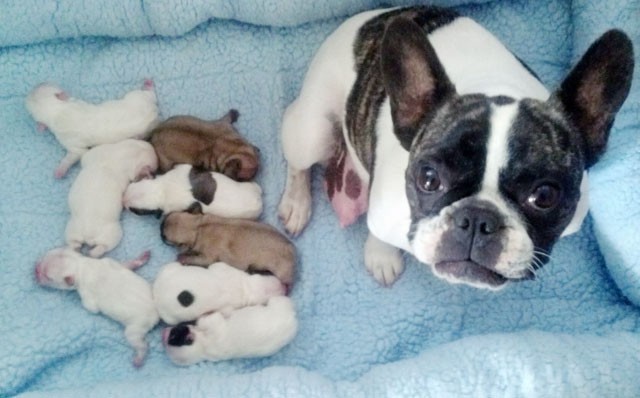
At 6 weeks of age, French Bulldog puppies enter a critical developmental phase marked by increased independence, playfulness, and social awareness. During this stage, these puppies are transitioning from mother's milk to solid puppy food while developing crucial motor skills and behavioral patterns. Their personalities begin to emerge as they interact more with littermates and humans. This period is fundamental for early socialization, basic training foundations, and establishing healthy routines. Understanding the unique needs and developmental markers of 6-week-old French Bulldogs is essential for breeders and prospective owners to ensure optimal growth and well-being during this formative stage.
6 Week Old French Bulldog Development
Physical Development & Energy Levels
At 6 weeks, French Bulldog puppies are becoming quite active and playful, requiring more space than just their whelping area. According to expert guidance, they need expanded pen space not only for play but also to learn the foundations of potty training by eliminating away from their main area. While still considered babies needing plenty of rest, they display increasing energy levels during wakeful periods.
Feeding & Training Fundamentals
By 6 weeks, French Bulldog puppies should be mostly weaned and getting the majority of their nutrition from puppy food rather than mother's milk. This is also when bite inhibition training begins in earnest, with the mother teaching them that hard biting is unacceptable. As noted by AKC experts, this early stage is crucial for establishing good habits through positive reinforcement. The puppy can be introduced to basic training concepts, but formal training should wait until they are a bit older. During this period, it's essential to maintain frequent positive human interactions while keeping them protected from other animals since they haven't received their vaccinations yet.
Understanding the 6 Week Development Stage of French Bulldog Puppies
Developmental Milestones and Care
At 6 weeks, French Bulldog puppies enter a critical socialization period. According to development experts, this is when they start showing natural trepidation towards new experiences and environments. While the mother continues teaching bite inhibition, puppies require careful exposure to positive experiences to build confidence. Their growing minds need appropriate stimulation through gentle play and controlled environmental enrichment. As noted in puppy development research, this stage marks the transition period where puppies begin developing fear responses and require a delicate balance between exploration and safety.
Weaning and Diet Transition
While the previous section covered general feeding fundamentals, this section focuses specifically on the weaning process details. At 6 weeks, French Bulldog puppies should be transitioning to solid foods with specialized nutritional requirements. According to veterinary guidelines, all their baby teeth have typically erupted by this stage, enabling proper chewing of solid food. The weaning process requires careful monitoring - food should be softened initially and gradually made firmer as the puppy adapts. Probiotics are recommended during this transition to maintain gut health. Multiple small meals throughout the day are preferable to fewer large ones to prevent digestive issues common in the breed at this age.
Conclusion
A 6-week-old French Bulldog puppy is in a critical developmental stage characterized by increasing activity levels, ongoing weaning from mother's milk to solid puppy food, and the beginning of crucial socialization periods. At this age, puppies require expanded space for play and early potty training while still needing plenty of rest. They are learning essential skills like bite inhibition from their mother and beginning to form fear responses, making positive experiences and controlled environmental exposure particularly important.
The research indicates this is a delicate transition period requiring careful attention to both physical and behavioral development. Proper nutrition through multiple small meals, protection from unvaccinated animals, and gentle positive reinforcement are essential care elements. While basic training concepts can be introduced, the focus should be on socialization and building confidence through controlled positive experiences. Moving forward, owners should maintain consistent feeding schedules, continue positive human interactions, and prepare for more formal training as the puppy matures.